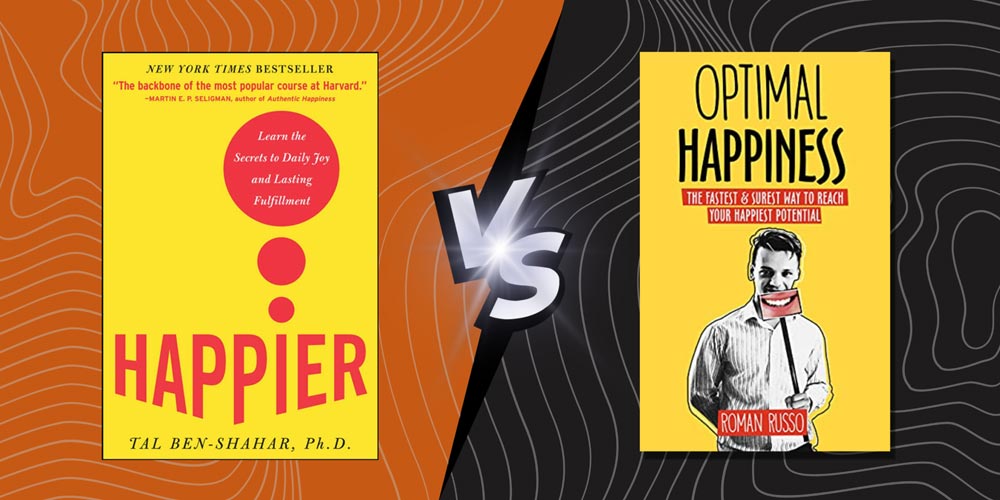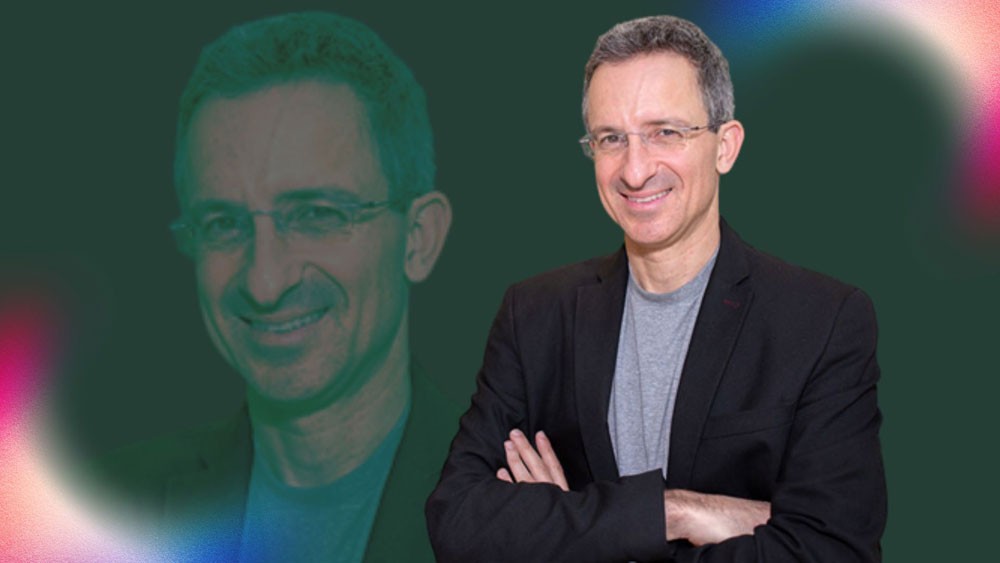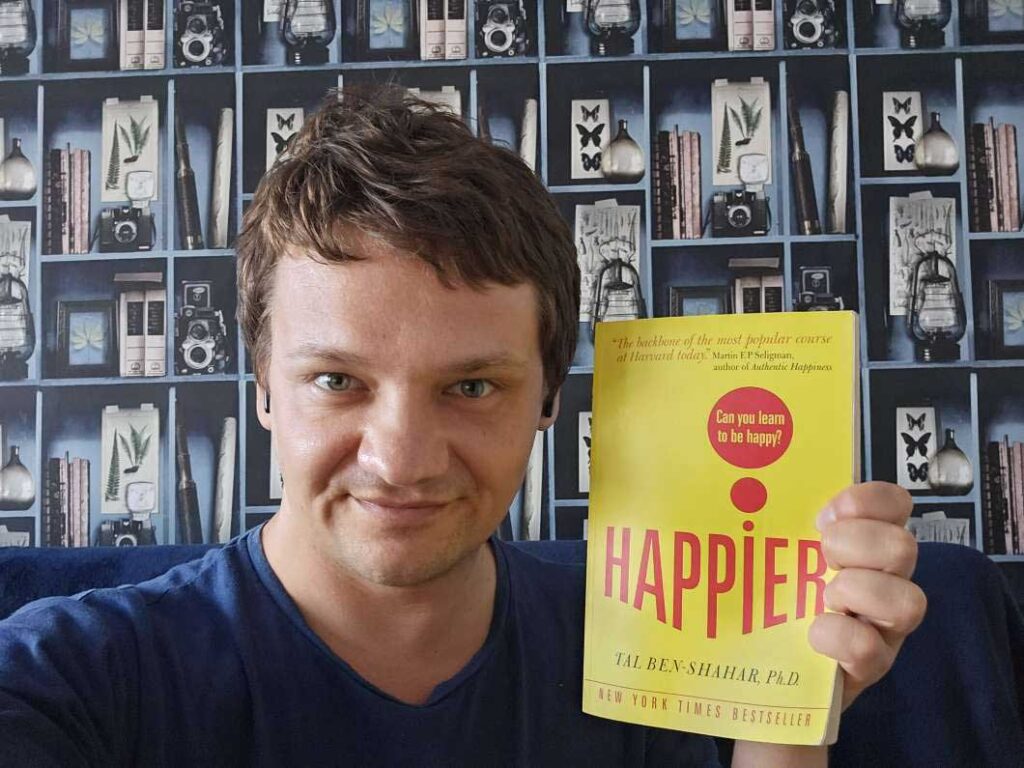
If you have ever researched “how to be happier?” it is possible that you have come across the work of Tal Ben-Shahar, Ph.D. and his book Happier: Can you learn to be Happy?, which we shall review today.
Overall, I really liked reading this book and I gave it a 9 out of 10 rating, as both the author and content of the book are great, being well-written. This 9/10 rating makes Happier by Tal Ben-Shahar one of the best happiness books that have been reviewed on this blog.
Who is Tal Ben-Shahar, Ph.D.?

Tal Ben-Shahar, Ph.D. is an Israeli-American author, educator, and lecturer. He is an expert on positive psychology, leadership, and life, work, and organizational satisfaction. He is best known for teaching one of the world’s largest university classes, called Positive Psychology, at Harvard University.
He is one of the leading modern-day experts on the topic of happiness, wellbeing, and positive psychology, as he teaches thousands of people in person and online how to be happier, making a positive contribution to the world.
“Happier”: The 9/10 Rating
In a different blog post, I introduced a unique way in which I analyze and rate different books on the topic of happiness, which uses a 10-point scale to rate the best and worst books on the market. Happier was rated 9/10 according to the following calculation:
Is it the science and art of happiness? Yes (Qualified)
Happiness is a God? No (Qualified)
Is it a happiness author? Yes (1 point)
Is it random happiness advice? No (1 point)
Is it a comprehensive happiness formula? No (0 points)
Is there a unique contribution? Yes (1 point)
Happiness is evasive? No (1 point)
Does it answer the 4 key questions of happiness:
– What is happiness? Yes (1 point)
– Why happiness? Yes (1 point)
– How to be happier? Yes (1 point)
– How to be the happiest we can be? Yes (1 points)
Is it easy to read? Yes (1 point)
Why Happier Isn’t 10 out of 10?
In Happier, Tal Ben-Shahar does not provide a full happiness formula, simply because the book isn’t that big. Yes, this book is full of interesting information, but by the end of the book I was still unable to answer the question “How to be the happiest I can be?” In other words, like in many other books on this topic, people are given many new pieces of the happiness puzzle, but never the full picture. As such, sooner or later people are still faced with the question of “How to be happier?” meaning that the search for happiness continues.
Interestingly, Tal Ben-Shahar never quite states that “happiness is evasive” and he hints at a possibility of an ultimate solution, never quite providing it. This is a common theme with many happiness authors and the reason Optimal Happiness exists, as we don’t just say “this can make you happier,” but we say “this is what it takes to become as happy as you can be,” ending the never-ending rat race for happiness in a lasting way.
My Favorite Lessons From Happier

I like happiness books that teach me something (although I always said that the Optimal Happiness formula is 99% complete) and I got a few interesting ideas from Happier. As such, I did learn a few interesting things from Happier such as:
The Hamburger Model – Tal Ben-Shahar compares four different types of “hamburgers” to four different ways we search for happiness. As such, our search for happiness can give us short-term vs long-term benefits versus detriments, which lead to:
- Happiness – When we get short-term and long-term benefits;
- Nihilism – When we get short-term and long-term detriments;
- Rat race – When we get short-term detriments and long-term benefits;
- Hedonism – When we get short-term benefits, but long-term detriments.
As such, “happiness” is the best case scenario, while “nihilism” can happen when people are afraid to be happy. A “rat race” happens because short-term sacrifice doesn’t always translate into long-term benefits, while “hedonism” doesn’t ultimately make people happy as they pay for present pleasure with future unhappiness.
Happiness is the ultimate currency – Tal Ben-Shahar states that “while not all people have the same access to material goods, most have equal access to the ultimate currency”, which is happiness. He continues by saying that “happiness and life satisfaction are similarly available to the young and the old, women and men, blacks and whites, the rich and the working class. The ultimate currency is the great equalizer.”
Prejudice against work – Essentially, our society teaches people to look down on work and give value to passivity and relaxation, while “people actually have more flow experiences at work than they do at home.” As such, “hardship, which we would never voluntarily invite into our life, can play an important role in our development [and] a struggle-free life is not always the best thing for us.”
Sacrifice isn’t synonymous with virtue – Our many sacrifices in marriage, work, and other parts of life aren’t a necessary part of the process, but rather a good way to build resentment when a person sacrifices for others. However, we can do what we dislike without making sacrifices in a time of need, but without sacrificing our core self, as this sort of work does not build resentment.
Happier: Book Review – The Last Words
Overall, Happier by Tal Ben-Shahar is a relatively short, but insightful book on how to become happier. It is full of interesting advice, but by itself it won’t make you happy today and forever. Sure enough, Shahar has even more books, such as Even Happier, Happier No Matter What, Being Happy, Happiness Studies, Short Cuts To Happiness, and a few others books not directly on the topic of happiness, as well as his course Happiness Studies.
Still, while I love well-researched and presented information from Tal Ben-Shahar, I would still recommend supplementing his material with material presented in Optimal Happiness as we teach people how to reach their happiest potential in a lasting way. This way, while, like me, you can still be learning interesting facts about happiness, you will exit the rat race of happiness.














